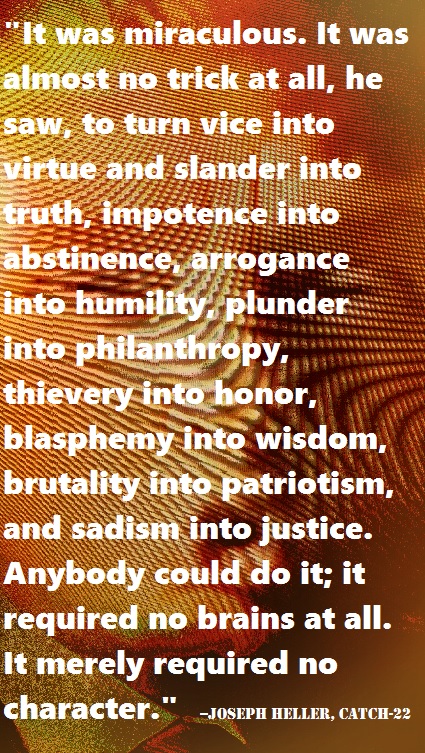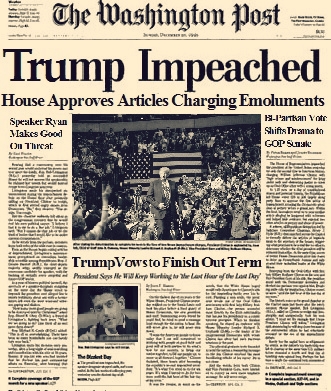Conservative Christians sometimes tell us that when bad things happen, like the AIDS outbreak in the 1980s, it is God’s way of telling us we have lost our way, become too permissive and sinful. The Almighty is trying to straighten us out by sending us plagues, storms, or earthquakes. Or else he is just, as C. S. Lewis once described him, the Cosmic Sadist and enjoys the miseries he creates.
Either way, God, at least the version that Catholics worship, is creating plenty of misery for the Republican Party in the form of a hurricane of a Pope: Francis. It has been several days now since Hurricane Francis issued what is called in the theological trade an “apostolic exhortation,” which is less authoritative than a papal encyclical, but carries more clout than a tweet. Or something like that.
In any case, this instantly famous exhortation is known in God’s tongue as Evangelii Gaudium, or in the tongue of mortals, “The Joy of the Gospel.”
It turns out, as far as God’s representative on Earth sees it, that the “joy” in the Gospel is not the ability to send your greenbacks to the Cayman Islands with a bottle of Banana Boat sunscreen and a command to relax and take it easy for a while. No, no, no. That’s not even close to the kind of joy this Pope is talking about. The fierce winds of Hurricane Francis threaten to blow away, or at least severely damage, all that the current iteration of the Republican Party represents.
“The Joy of the Gospel,” is, of course, primarily an exhortation for Christians, including the Church hierarchy, to renew their “personal encounter with Jesus Christ,” to never “tire of seeking his mercy,” to “start anew” and “enter into this great stream of joy.” There is also plenty of praise for the “delightful and comforting joy of evangelizing.”
But the gusts of prose that have done, and hopefully will continue to do, real damage to the Republican brand are found in Francis’ “guidelines” as to how the Church’s “new phase of evangelization” should be accomplished. He writes (his emphasis):
All of them help give shape to a definite style of evangelization which I ask you to adopt in every activity which you undertake.
Uh-oh. You mean, every activity? Even government activity? Yes. Even that one.
The Pope says that while there have been many advances made “to improve people’s welfare,” there are some rather large gaps:
…we have to remember that the majority of our contemporaries are barely living from day to day, with dire consequences. A number of diseases are spreading. The hearts of many people are gripped by fear and desperation, even in the so-called rich countries.
Francis also said something that has largely been overlooked in the popular press:
We are in an age of knowledge and information, which has led to new and often anonymous kinds of power.
We see such anonymity at work here in the United States, as wealthy political donors are able to hide behind virtually unregulated front groups, many of whom promote the kinds of economics that the Pope next condemns:
Just as the commandment “Thou shalt not kill” sets a clear limit in order to safeguard the value of human life, today we also have to say “thou shalt not” to an economy of exclusion and inequality. Such an economy kills.
That may be as concise and devastating a critique of laissez-faire economics as you will ever read: “an economy of exclusion and inequality” doesn’t just injure people, it kills them. And just as there ought to be laws designed to deter murderous people, there also ought to be laws designed to deter murderous economies. That parallelism is quite clear. And it most definitely stands against everything that the Republican Party currently stands for.
The Hurricane continues with an equally devastating critique of the news business:
How can it be that it is not a news item when an elderly homeless person dies of exposure, but it is news when the stock market loses two points?
And how can it not be a news item when tens of millions of Americans go without health insurance every year, many of them sick and some of them dying, but it is news when John Boehner, falsely it turns out, claimed he had trouble enrolling on the ObamaCare website? Something is very wrong, as the Pope recognizes.
But he wasn’t done with his attack—there is no other word for it—on Tea Party economics:
Today everything comes under the laws of competition and the survival of the fittest, where the powerful feed upon the powerless. As a consequence, masses of people find themselves excluded and marginalized: without work, without possibilities, without any means of escape. […]
In this context, some people continue to defend trickle-down theories which assume that economic growth, encouraged by a free market, will inevitably succeed in bringing about greater justice and inclusiveness in the world. This opinion, which has never been confirmed by the facts, expresses a crude and naïve trust in the goodness of those wielding economic power and in the sacralized workings of the prevailing economic system. Meanwhile, the excluded are still waiting.
It is this analysis, this tree-snapping, roof-ripping analysis, that has people like Rush Limbaugh scrambling for the rhetorical basement:
This is just pure Marxism coming out of the mouth of the pope.
A slightly more sober right-wing commentator, Charles Krauthammer, gave Francis, “a man who lived it in his own life,” credit for “incredible authenticity,” and then said:
I think it’s going to have a lot of influence, and I think it will unfortunately set back the movement in the Church at least recognizing how capitalism and the free market allows for the flourishing of individuals in a way that socialism and of course communism never did.
Notwithstanding Krauthammer’s suggestion, Pope Francis is not championing socialism or communism. He’s not a Marxist. He is attacking an economic system that has too little regulation, one without an enforceable code of what the Pope sees as Gospel-inspired ethics, which “would make it possible to bring about balance and a more humane social order.” And it is here where I will emphasize something he said that deserves much more attention:
A financial reform open to such ethical considerations would require a vigorous change of approach on the part of political leaders. I urge them to face this challenge with determination and an eye to the future, while not ignoring, of course, the specifics of each case. Money must serve, not rule! The Pope loves everyone, rich and poor alike, but he is obliged in the name of Christ to remind all that the rich must help, respect and promote the poor. I exhort you to generous solidarity and a return of economics and finance to an ethical approach which favours human beings.
 Keep in mind that Francis is saying this to “political leaders.” And he is placing it all in the context of the Gospel, in the context of the evangelization of the world. No matter what you think of the Pope’s motives, no matter what you think of the source, this quite radical message represents all that is good about Christianity and all that our New Deal social policies inherited from it.
Keep in mind that Francis is saying this to “political leaders.” And he is placing it all in the context of the Gospel, in the context of the evangelization of the world. No matter what you think of the Pope’s motives, no matter what you think of the source, this quite radical message represents all that is good about Christianity and all that our New Deal social policies inherited from it.
What Francis is saying is a galaxy away from attempts by Republicans—almost all of them Christians—to sabotage the new health care law and to keep millions from entering into the joy of its benefits. What he is saying is a universe away from fights over food stamps and unemployment benefits, from attempts to cut Social Security and Medicare and Medicaid.
Yes, what this refreshingly strange and cyclonic man of God is saying is far away from all that, but it is near to the heart of the best of our holy books. And, dare anyone to believe it, perhaps his words really are near to the heart of God.
[Photo: AFP]








thgeneralist
/ December 2, 2013Yes — and 6 of the 9 SCOTUS justices are Roman Catholic — 5 of those 6 claim to be conservative, i.e., they get their marching orders from the Pope. Or from Jesus. Either way, they and their Bible-thumping, Climate-denying, Evolution-hating (except when it comes to humanitarian survival of the fittest), Tea Party beholdin’ congressional pals are so deeply engulfed in their pseudoChristian hypocrisy that what the Pope (a man with a remarkably checkered past) says won’t matter an angel’s fart to them. Jesus and his boys were socialists. The early Church was extremely socialistic. The corporate church sold out to the the state @1700 years ago, nullifying its relationship to the harder teachings of Jesus in exchange for perpetual power over the people and their purse. Like today.
LikeLike
R. Duane Graham
/ December 2, 2013Yes, there is plenty of “pseudoChristian hypocrisy” going on in Congress. And to many of those folks, an angel’s fart would have much more fire power than what the Pope says.
I do, though, think it is important that we remember that despite the fact that this interesting new Pope is on our side when it comes to economic justice, he still represents an institution that is holding back progress in other ways, particularly when it comes to the Church’s position on contraception, a position that does much damage in poor countries. I don’t see that changing, even under Francis, but I hope I am wrong about that. Talk about a radical move.
You suggest that the “corporate church sold out to the state” many years ago, but Francis at least represents a very aggressive rhetorical turnaround of that situation. I don’t take that lightly. It is an important social development, if not a theological one. When I was a right-wing conservative, most of my intellectual heroes were committed Catholics, like William F. Buckley, who at once revered the Church but criticized its modernization. In effect, these intellectuals used the same analysis on the Church as they did on society as a whole: when it’s not necessary to change, it’s necessary not to change. Francis represents the antithesis of that kind of thinking, and to the extent there are so many
And only if there were a comparable leader of American evangelicals, who constitute a large part of the GOP. A leader who at least would not fight those, including those who are secularists, who want to use government, not necessarily as an instrument of God’s will, but as a tool to achieve a more humane society, then we would have a much better country. Instead, as you noted, these folks are more worried about denying the validity of science and promoting a survival-of-the-fittest philosophy. How sad that is.
Duane
LikeLike
thgeneralist
/ December 2, 2013Fair enough. I hope Francis DOES help facilitate a shift. Jim Wallis is a thoughtful “evangelical” who is often pissing against the wind.
LikeLike
R. Duane Graham
/ December 2, 2013I agree. If there was such a thing as a liberal media, Wallis would be a star.
LikeLike
Herb Van Fleet
/ December 3, 2013Duane,
Here is another quote from the pontiff’s 72 page “apostolic exhortation” that I think contains some wisdom that should be considered by all, whether you’re Catholic, Protestant, or atheist:
“While the earnings of a minority are growing exponentially, so too is the gap separating the majority from the prosperity enjoyed by those happy few. This imbalance is the result of ideologies, which defend the absolute autonomy of the marketplace and financial speculation. … A new tyranny is thus born. … The thirst for power and possessions know no limits. In this system, which tends to devour everything which stands in the way of increased profits, whatever is fragile, like the environment, is defenseless before the interests of a deified market, which become the only rule.” Wow!
And Rush Limbaugh is right — Christianity, if followed literally, is truly a Marxist organization. Here are just a few examples:
1 Timothy 6:9 ESV, “But those who desire to be rich fall into temptation, into a snare, into many senseless and harmful desires that plunge people into ruin and destruction.”
Matthew 19:21 ESV, Jesus said to him, “If you would be perfect, go, sell what you possess and give to the poor, and you will have treasure in heaven; and come, follow me.”
Proverbs 28:27 ESV, “Whoever gives to the poor will not want, but he who hides his eyes will get many a curse.”
And my favorite: Acts 2:44-45 ESV, “And all who believed were together and had all things in common. And they were selling their possessions and belongings and distributing the proceeds to all, as any had need.”
Herb
LikeLike
R. Duane Graham
/ December 12, 2013Herb,
I appreciate those verses. I was taught them in Church often. The trouble with them is that certain conservative Christians will assent to the power and authority of verses like those, but interpret them in ways that apply only to individual relationships, excluding government from the analysis. In other words, they say, when the Bible talks about giving to the poor, it is talking about Herb and Duane giving to the poor, not about Herb and Duane handing our money over to the government to give (“redistribute”) to the poor. This particular interpretation of the meaning of those verses is why conservative Christians are not moved by arguments advocating government social programs based on scriptural references to the poor.
And I think I would quibble with your assertion that “Christianity, if followed literally, is truly a Marxist organization.” I assume you mean “if Jesus were followed literally” because otherwise Christianity, as an institution, has been many things at many different times to many different people. In fact, as Bart Ehhrman and many others have pointed out, there are lots and lots of Jesuses out there, too. But at least with Jesus, we can analyze for ourselves the words he (allegedly) spoke. We have in the NT what are claimed to be authentic claims he made and authentic ideas he advanced. And in those words I don’t find much evidence to support a claim that he was a Marxist, since Marxism involves an analysis of our economic system (capitalism) and how that system affects the larger society. Jesus wasn’t about that.
I do, though, find many examples where he was an anti-materialist, which one might stretch to say is sort of a proto-Marxist stance. And one could interpret some of his sayings in light of class conflict, as well as stretch his words to suggest that he was applying a materialist interpretation of history to events he saw (and, allegedly, “foresaw”). And, lest we forget, he did hand out free food and free health care to those who came to see him! So, if you mean Jesus was a Marxist in that limited (and admittedly historically distorted) sense, then I suppose there is some merit to it!
Duane
LikeLike